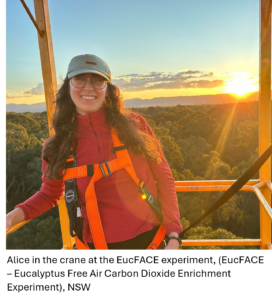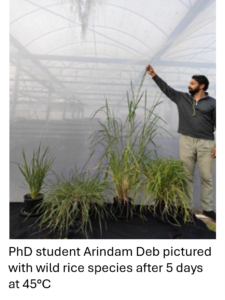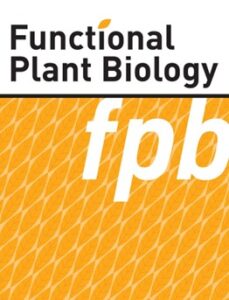Welcome to the June 2025 Phytogen!
This month, we are excited to share important updates about the ASPS Conference 2025, including the launch of travel awards and expanded program details. We feature Alice Temara, a PhD student at the Australian National University, who shares her journey from Belgium to Australia and her research on leaf respiration and photosynthesis relationships. We also feature research insights from Dr. Robert Sharwood, our Education Representative, detailing his mission to develop climate-resilient crops through advanced photosynthesis studies.
As we approach the conference season, we encourage all members to stay engaged and plan their participation in our upcoming event. You can stay connected with ASPS on social media on the following platforms: LinkedIn, Australian Society of Plant Scientists; BlueSky: @asps-oz.bsky.social. Join the conversation using #AusPlantSci and #ASPS2025 (for the conference). Tag us in your posts to help us promote your science! Phytogen contributions will also be featured on our social media pages.
We welcome contributions from students, E/MCRs and established researchers at any time for publication in Phytogen. It is free and a great way to give your research profile a boost and share your findings! You can send your contribution to our editors Raz (razlin.azman@csiro.au) or Lucas (L.Auroux@latrobe.edu.au).
ASPS 2025 Conference Update
Travel Awards Now Open!
We are pleased to announce that ASPS travel awards are now available! Financial support is provided for students, carers, and indigenous members attending our Adelaide conference. This initiative reflects our commitment to ensuring diverse participation and accessibility for all members of our plant science community.
Registration opens in July 2025 – stay tuned for detailed registration information and early bird pricing!
Updated Conference Program
Building on our previously announced session lineup, we are pleased to provide additional program details:
Session Topics:
- The Future of Plant Science (student-led)
- Teaching, Outreach & Indigenous Learnings
- Nurturing Symbiosis – Insights from Early and Mid-career Researchers
- Stress Sensing, Signalling and Membrane Transport
- Plant Evolution & Ecology
- New Technologies & AI in Plant Science
- Plant Nutrition & Development
- Frontiers in Genetics & Molecular Biology
- Synbio / Green Biomanufacturing
- Plant Organelle & Energy Biology
- Industry-led Session
The program will feature keynote presentations, poster presentations, and networking opportunities (activities and dinner) designed to foster collaboration across the Australian plant science community.
For more information about the conference, including travel award applications and upcoming registration details, visit: https://www.asps.org.au/asps25
If you have any questions about the conference, contact Dr. Crystal Sweetman at crystal.sweetman@flinders.edu.au.
Student spotlight
 Alice Temara
Alice Temara
PhD Candidate, Atkin’s Lab
Australian National University, Canberra
LinkedIn: Alice Temara
My name is Alice Temara, and I come from Brussels in Belgium — a tiny European country, especially when compared to Australia… and many others. Here’s the story of how I ended up on the other side of the world.
My scientific journey began at the Université Libre de Bruxelles (ULB), where I completed both my bachelor’s and master’s Bioengineers degrees. In October 2022, while searching for an internship as part of my master’s program, I attended a conference at ULB about the impacts of climate change on Australian biodiversity, presented by Pr. David Ellsworth. At the end of his talk, I didn’t hesitate a minute — I approached him and asked whether he was looking for an intern. And guess what? Nine months later, I was working at Australia’s largest climate change research facility: the EucFACE experiment, at Western Sydney University in NSW. I studied the effects of elevated CO₂ on photosynthetic rates of shrubs and grasses using the Licor-6400. I also looked at the impact of phosphorus fertilisation as Australian soils lack phosphorus, compared to European soils being poorer in nitrogen.
It didn’t take long for me to realise that what truly excites me is studying climate change with the goal of making a real difference. I also discovered how much I enjoy working outdoors, immersed in nature and surrounded by unique flora and fauna.
After an incredible three-month internship, I returned to Belgium to pursue my studies and complete my master’s thesis. My thesis was based on a large dataset of photosynthetic measurements collected by ten leading scientists across 14 tropical rainforests in Australia, covering 132 species and 5 Plant Functional Types. As part of this research, I also had the chance to visit the Daintree Rainforest Observatory, the world’s oldest rainforest located in Queensland. Such an incredible place!
Leaving your friends and family behind to move across the globe is never easy. My experience abroad had its challenges, but most of it was absolutely amazing. So, when I came across a PhD opportunity at the Australian National University (ANU), focused on a topic closely aligned with my previous work — leaf gas-exchange measurements — and my passion for climate change research, I didn’t think twice. I applied, and I am now part of the Atkin’s lab in Canberra!
My PhD focuses on the relationship between leaf respiration and photosynthesis. While these two processes have been widely studied individually, few studies explore how they interact. I’m investigating whether this relationship is influenced by carbohydrate mobilisation and Rubisco content, across species from tropical, temperate, and boreal forests.
While my PhD began only three months ago, I’ve already had the chance to collect 2 weeks data at the Whole Tree Chamber (WTC), in Western Sydney University, and another week at the EucFACE site. Fieldwork involved day and night measurements – physically demanding, but always exciting, especially when local wildlife like snakes, kangaroos, or skinks drop by to say hello!
I’m truly excited to continue this journey, one that is already enriching me with new skills and unforgettable human experiences.
You can follow me on LinkedIn where I will share my experiences and research updates.
“Le mot de la fin”: Don’t hesitate to go abroad and explore – it might just change your life!
Education Representative Contribution
 The scientific mission to ensure future food and fibre production by developing climate adapted germplasm
The scientific mission to ensure future food and fibre production by developing climate adapted germplasm
Dr. Robert Sharwood,
ASPS Education Representative
Senior Lecturer in Translational Photosynthesis. Hawkesbury Institute for the Environment, Western Sydney University.
Perhaps the greatest challenge of our time is to ensure the sustainable production of nutritious food in a backdrop of severe changes in climate that impacts production of food and fibre. In general, crop production in Australia is often in water limited environments and with the threats of increasing heatwaves and drought conditions, we need to develop new germplasm that is adapted to these extreme climate scenarios. This in essence will require germplasm that is able to mitigate yield penalties associated with declines in photosynthetic carbon assimilation that provides the carbohydrate building blocks for plant growth and ultimately yield.
Within my group we study how the fundamental concept of how climate-of-origin influences the response of photosynthesis in crops and their wild relatives when challenged with heatwave and drought conditions. We explore how resilience to these climate challenges are achieved at both the leaf level biochemistry and genomic levels. We use latest phenotyping technologies to screen for changes in plant physiology to identify resilient plants that require a deeper investigation.
 As an example, Arindam Deb a dual HDR Student with Keraala Agricultural University (KAU), India and Western Sydney University has been studying how wild rice copes with severe heatwaves. Pictured right is Arindam with his plants. He has analysed the gas-exchange response of photosynthesis on plants exposed to a 45oC heatwave and will focus on the underpinning biochemistry of CO2 fixation.
As an example, Arindam Deb a dual HDR Student with Keraala Agricultural University (KAU), India and Western Sydney University has been studying how wild rice copes with severe heatwaves. Pictured right is Arindam with his plants. He has analysed the gas-exchange response of photosynthesis on plants exposed to a 45oC heatwave and will focus on the underpinning biochemistry of CO2 fixation.
In a project funded by the ARC Discovery program in collaboration with Maria Ermakova (Monash University), Oula Ghannoum (WSU) and Robert Furbank (ANU), we are studying how the primary carboxylase of C4 photosynthesis, phosphoenolpyruvate carboxylase (PEPC), influences the CO2 concentrating mechanism through altering its content and catalytic properties. We have three PHD students, Sarah Fletcher, Jasmine Divinagracia and Umodhi Bokalamulla studying the various aspects of enhancing PEPC catalysis.
Recently, as a Co-CI, our team at HIE partnered with the Australian National University and the University of Western Australia was awarded an ARC training centre for Smart and Sustainable Horticulture. The mission of the centre is to train the next-generation practitioners in all aspects of protected cropping from developing new crops in protected settings, monitoring their growth for yield and disease and developing solutions for the sector to aim towards net-zero carbon emissions.
Help Shape the Voice of Functional Plant Biology Online
Are you passionate about plant science and skilled in social media? Functional Plant Biology is seeking a Social Media Editor (or multiple) to join its editorial team!
This is an opportunity for an early-mid career researcher to gain experience on the editorial board of a journal, contributing to the journal’s mission by enhancing its digital presence and engaging with the global plant science community. The Social Media Editor will work closely with the editorial board and publishing team to:
1. Promote journal content on BlueSky
2. Develop strategies to grow and engage the journal’s online audience
3. Highlight key research, authors, and special issues functional plant biology
4. Support outreach during conferences and events
We welcome expressions of interest from researchers, science communicators, and digital-savvy professionals who are enthusiastic about plant biology and science communication.
🔗 Learn more and apply here: https://www.publish.csiro.au/fp/ExpressionsofInterest
Applications are open now—please share this opportunity with your networks!
Is Your Membership Up to Date?
ASPS membership connects you with Australia’s plant science community and provides valuable professional development opportunities. Student memberships are available at reduced rates.
Membership Benefits:
- Access to a network of plant scientists across Australia
- Discounted registration for conferences
- Eligibility for ASPS awards and travel grants
- Regular updates through Phytogen newsletter
Become a member, check and/or renew your membership status HERE.
Editors’ note
Thank you for reading the June edition of Phytogen. We hope you’ve enjoyed learning about Alice’s inspiring international journey and Robert’s insights into educational innovation. With conference preparations underway and travel awards now available, we encourage all members to consider participating in our Adelaide conference. Stay tuned for our July issue, where we’ll provide registration details and highlight more exciting developments in Australian plant science research.
Newsletter written & edited by Lucas Auroux and Razlin Azman.Invited contributions: Alice Temara (Student Spotlight) and Robert Sharwood (Education Representative).
We thank all contributors for their valuable insights and continued support to the ASPS community.




